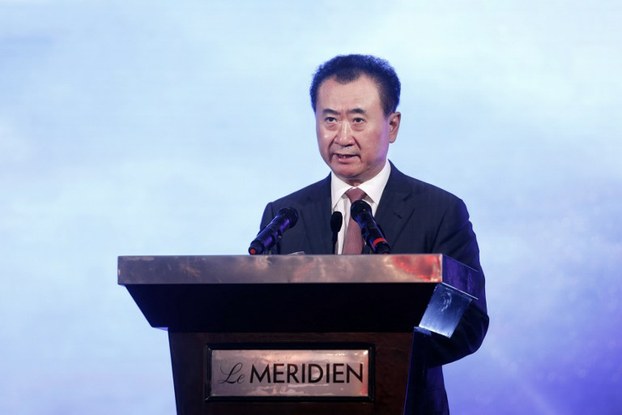




China's richest man has unveiled plans for a glitzy new movie studio complex in an eastern port city that he hopes will rival Hollywood.
But analysts say Chinese films will need more cultural freedom if they are to make a real impact internationally.
Wang Jianlin, whose conglomerate Wanda became the world's largest cinema operator after acquiring U.S. cinema chain AMC Entertainment, launched the plans for the Qingdao studios at an event attended by global A-list celebrities including Nicole Kidman, Leonardo DiCaprio and Catherine Zeta-Jones on Sunday.
His 50 billion yuan (U.S. $8.3 billion) Oriental Movie Metropolis complex will house 20 studios that will turn out 100 films a year, including 30 foreign productions, according to Wanda's plans.
Meng Xuan, commentator for the U.S.-based Chinese language World Journal newspaper, said the multi-billion yuan complex would boost China's existing film industry, best-known overseas for historical blockbusters, kung fu action and starkly beautiful art-house films.
"China is full of energy and optimism right now, and there is a lot of imaginative power in a lot of areas," Meng said.
He said the hilly coastal region of Qingdao, a former German concession town and home to China's best-known brand of beer, was an ideal location for the venture, which is scheduled to open for business in 2016.
As well as lavish production facilities, the Movie Metropolis project will also feature a 3,000-seat cinema and a shopping mall and hotel complex.
"Qingdao is pretty prosperous, and it has beautiful natural scenery, and all the benefits of being a port city," Meng said.
Boosting 'soft power'
Sun Yuanzhao, acting director of the U.S.-based Asia Pacific Legal Institute, said China had the capacity to create something new out of cultural influences from both east and west, that could eventually boost Beijing's bid to boost its "soft power" overseas.
"The movie industry is one manifestation of cultural and soft power," Sun said.
But he said Beijing might need to widen its cultural horizons if its movie industry was to become more widely known internationally.
"At a policy level, [we don't know] if they have a completely integrated policy aimed at developing [China's] soft power [overseas]," Sun added.
China's State Administration of Radio, Film and Television (SARFT) currently imposes a quota of just 34 foreign films that can be shown in the country each year.
These made up more than half of Chinese box office sales last year, but the first half of this year saw the tables turning in favor of homegrown production, with ticket sales for Chinese films outselling foreign films for the first time in five years.
According to Meng, Chinese films will also need to shake off any ideological constraints currently imposed by the ruling Chinese Communist Party, if they were to become truly successful internationally.
Currently, the Party keeps a tight leash on all aspects of film screening and production, sometimes withdrawing films at the last minute and cutting any subject matter that might be politically sensitive.
But, according to Meng, the talent exists already.
"China has its own tradition of filmmaking, with its own artistic achievements and [directorial talent] in the third, fourth and fifth generations [of filmmakers]," he said.
Reported by Yang Jiadai for RFA's Mandarin Service. Translated and written in English by Luisetta Mudie.